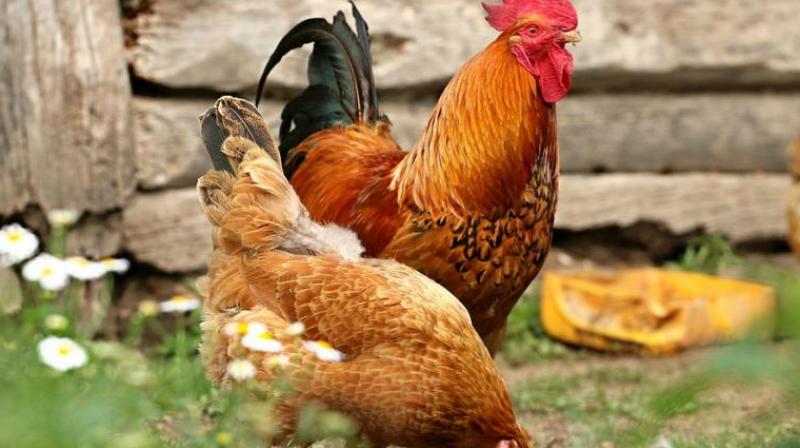Harmful germs in country chicken
Experts blame indiscriminate use of antibiotics for problem.

Hyderabad: Country chicken or natu kodi, as it is popularly called in Telugu, is often looked at as a healthy alternative to broiler chicken. However, thanks to growing contamination, even natu kodi is having drug resistant bacteria.
A report published this month by researchers from the UoH, led by Dr. Niyaz Ahmed, found multiple drug resistant Helicobacter pullorum (H.pullorum) bacteria in samples of broiler chicken and free range chicken from the city. 100 samples were taken from various markets and areas across Hyderabad.
Dr Ahmed, a teacher of the biotechnology and bioinformatics department, UoH, is now serving as senior director at the International Centre for Diarrheal Disease Research in Dhaka.
The H.pullorum bacteria isolated from chicken samples by researchers was found to be resistant to four major classes of antibiotics, viz. fluoroquinolones, cephalo-sporins, sulfonamides and macrolides.
H.pullorum is a zoonotic bacterium, which means that it can be transmitted from animals to humans. This happens frequently through poultry birds.
H.pullorum is already known to be carrying a toxin that can interfere with the cell cycle causing damage to the DNA, leading to cancer.
The presence of multiple drug resistant bacteria in broiler and free range chicken points towards two major issues — indiscriminate use of antibiotics by humans on animals and unsanitary conditions in cities.
While broiler chickens are given high doses of antibiotics directly, free range chicken pick up antibiotic residues from the environment as they live in unsanitary human habitations and are exposed to human and animal waste containing antibiotic residues or resistant micro-organisms.
Dr Ahmed said, “With the risk of zoonosis and its ability to spread antimicrobial resistance, H.pullorum could be emerging a food borne human pathogen that needs to be deciphered at the genomic and molecular levels.”
He added, “There is no harm to public health as long as the chicken is cooked properly. It is better to avoid liver and intestines as H.pullorum is found mainly in these organs.”
No law yet to regulate antibiotic use in poultry
Indiscriminate use of antibiotics in poultry birds is a serious concern in the country, yet there is no legislation by the government to regulate the trend.
As of now, there are only two advisories by the Food Safety and Standards Authority of India (FSSAI), released in June and December 2014, which restrict the use of antibiotics in feed and feed supplements.
Apart from this, the FSSAI has also advised that any antibiotic use on animals must be carried out under veterinary supervision.
Last year, the Food Safety and Standards Authority of India released draft rules in which the two advisories were made mandatory. However, there has been no change since and the rules continue to be in the draft stage.
Amit Khurana, programme manager with food safety and toxins division, Centre for Science and Environment, said: “Antibiotics have therapeutic and non-therapeutic uses in the poultry industry. While the therapeutic use is required for the healthcare of the birds, non-therapeutic use is where antibiotics are used as growth enhancers in chicken. It is a known fact that a major use of antibiotics in poultry industry is for non-therapeutic purpose, which needs to be curbed but there exists no rule against it till now.”
Dr Niyaz Ahmed, a teacher at the biotechnology and bioinformatics department, University of Hyderabad, who published a study recently regarding the finding of multiple drug resistant bacteria in chicken samples across the city, said, "Poultry farm owners should stop adding antibiotics to feed. Also, feed manufacturers should not use antibiotics as additives in feed formulae. There should be some regulation on feed composition."
Telangana is one of the top producers of poultry products in India. The monthly poultry output from Telangana is around 4 crore kg of chicken and 90 crore eggs.
The recently published Sample Registration System Baseline Survey 2014 data by Census of India said Telangana has the maximum non-vegetarians in the country, with 98.8 per cent of men and 98.6 per cent of women in the state being confirmed, frequent non-vegetarians.

